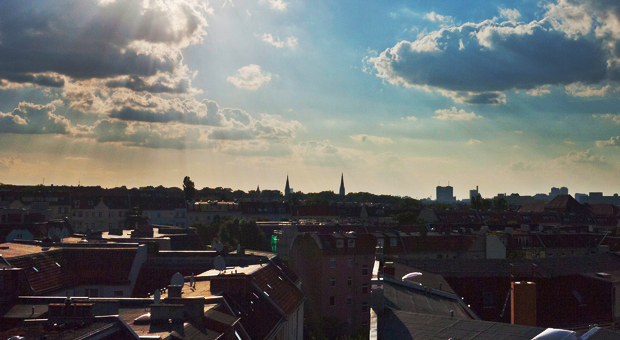
Brokerage Event: the selected idea-carriers
MedSpring is happy to announce that the following ideas/projects have been selected: we congratulate with all the participants for the high quality and innovative character of their proposals!
We'll be live-tweeting the Brokerage Event: feel free to use your social accounts (twitter and facebook) to interact with us and to comment by using the hashtag: #MedSpring.
Bookmark the livestreaming page now!
1. We deliver taste, the Netherlands
A web-based service to directly connect conscious consumers with sustainable producers of quality products from the Mediterranean. Making use of the sharing economy, the platform will facilitate direct sales of quality products between a network of producers, consumer clusters and professional chefs, administered by “food angels” in different cities across Europe.
[Web site: http://www.wedelivertaste.com]
2. Optimum Utilisation of Hybrid Advanced Wave and Wind Energy for Innovative Sustainable Power Generation and Sea Water Desalination for Clean Environment, Egypt
Wind energy can be a major energy resource in future. The main disadvantage of this renewable energy resource is the unsteady nature of wind strength. The magnitude of this disadvantage can be reduced by combining an offshore wind turbine with a wave energy converter.
[Web site: www.bluepower-int.com]
3. Sahara Forest Project, Norway
The Sahara Forest Project seeks to develop integrated technology solutions to global challenges by using what we have enough of – CO2, sunlight, and seawater – to make what we need more of – food, freshwater, and clean energy – in desert environments.
[Web site: www.saharaforestproject.com]
4. Developement of Sensitive Methods for the Detection Active Bacteria in Water using Nano-biotechnology, Tunisia
The aim of this project is to examine the efficiency of water disinfection process such as UVC irradiation, photocatalysis, solar disinfection, etc. The combination of biological and nanotechnology tools permit to develop a sensitive, and rapid method to evaluate the microbiological quality of water and to ensure the safety of produced water
[Web site: http://www.certe.rnrt.tn]
5. Roof-top Gardening, Canada
The key pilot project aims to build roof-top gardens in the interest of food sovereignty while also influencing community spaces, waste management, health and livelihoods. Refutrees long-term vision is to create a model that is self-sustaining, replicable and has the capacity to generate income for local communities.
[Web site: www.refutrees.org]
6. Machine for Raising Water, Palestine
Machine for Raising Water is a project to re-design and produce a new version of the Saqiya, a traditional Middle Eastern water/irrigation technology, which has been used across Egypt and the Arab world for almost one thousand years, in downtown Cairo.
[Web site: http://josephaudeh.com]
7. High Atlas Agriculture and Artisanal (HA3), Morocco
This organic agricultural project endeavors to transform the Moroccan entrepreneurial ecosystem and lift family farmers out of poverty through building a green economy.
[Web site: http://www.highatlasfoundation.org]
8. Citizen Cow, France
This start-up aims to improve the traditional backyard family economy through small dairy units, rather than one big factory. In so doing, the dairy lodges aim at animal feeding and milk selling autonomy. Hence the development opportunities are huge and job and income generator to a diffuse macro-economic level.
9. Land2Lend, Italy
Land2Lend goal is to give new life to unused (urban) land, for agricultural production (even organic farming), using an innovative sharing mechanism of the land to be cultivated.
Land2Lend rethinks the idea of traditional farm, by creating a very short production chain, due to the synergistic cooperation of farmers, institutions and research and training organizations.
10. Sanification of legumes from pests by microwave, Italy
This experience has produced results which represent a breakthrough in the techniques of disinfestation of legumes and cereals through a methodology of microwave disinfection alternative to the use of fumigants: chemical gases produce residues in food for a long time and consumers are exposed to the risk of poisoning. The possible applications are in post-harvest and in the conservation phase of raw materials hardly free of pests, with the economic benefits that allow the recovery of 10-15% of product.
[Web site: http://www.emitech.it)
11. Sbskin, Italy
The basic need that SBskin - Smart Building Skin s.r.l. plans to fulfill is to reduce buildings harmful CO2 emissions, through novel solutions of high aesthetical and technological quality that are able to improve buildings energy performance at reasonable costs. The solution designed are multifunctional glassblock components for sustainable building envelopes.
[Web site: www.sbskin.it)
12. Drawer Compacted Sand Filter: innovative and cutting-edge greywater treatment unit to achieve food security amongst poor urban communities, Jordan
Treatment of domestic wastewater by using innovative unit called “ Drawer Compacted Sand Filter DCSF”. DCSF is a modified sand filter design in which the sand filter is broken down into several layers approximately 10 cm high, each of which is placed in a movable drawer that is stacked vertically, thus ease the diffusion of oxygen between different layers, so that the filter will function with fully aerobic conditions. The DCSF system proved to be a reliable treatment method for greywater with a very low land footprint and minimal maintenance requirements, thus making it suitable for a wide range of geographical settings.
[Web site: http://www.rss.jo]
13. Production of Organic Cactus Soap: penetrating the local market using locally produced organic cactus soap, Jordan
This project is considered as an extension phase for our previously funded project: “The cultivation of Organic Cactus in the Jordanian Badia”; now is moving from production of organic cactus to produce the organic soap (for the first time in Jordan) and going internationally. The main objectives are: 1) To produce desirable cactus soap in the Jordanian market; 2) Build the capacity of locals in the field of cactus soap manufacturing; 3) To offer better jobs opportunities for locals mainly women; 4) To optimize cactus production potential in Jordan.
[Web site: www.ncrd.gov.jo]
14. Innovation functional mixtures flour recipes for production of free gluten and low phenylalanine bakery especially for sensitivity patient, Jordan
In Jordan the local markets are lacking for low phenylalanine free gluten flour, except of some imported ones which are very expensive or not available regulatory especially outside of Amman consumers. The aim of the project is to invent and to offer formulas of low phenylalanine and free gluten flour for produced bakeries for Phenylketonuria (PKU) and Coeliac disease (CD) patients.
The results of this project also will be available for the neighboring countries of Jordan, which it shares with the trade and economic relations and the transfer of experience.
[Web site: www.facts-center.com]
15. Innovative Food Supplements for elder and children, Egypt
The aim of the project is to develop a food product for elderly with the objective to promote healthy brain aging. It aims to develop stabilized rice bran nutraceuticals for healthy aging with potential benefits for Alzheimer’s disease.
[Web site: http://www.ricencare.com]
16. Smart, Innovative and economic storage of wheat and other grains in Egypt and Africa, Egypt
Innovative storage of wheat and other grains, brans (rice and wheat) in horizontal silos and barrier film bags. For the African countries and MENA region, this system is superior to the current storage in open fields with more than 30 % grains waste during storage. It needs less investment, easy operation for storage and handling and can solve a big problem (even in Egypt) for hunger due of loss of grains harvest during storage.
[Web site: http://www.itm.com.eg]
17. Wastewater Treatment using high efficient, Low cost Hydro cyclone unit (mobile unit) San-cyclone, Egypt
This proposal presented a new, simple, high efficient, low cost, and physical separation technique for wastewater treatment compared with the traditional solutions. The hydro-cyclone separator has many advantages and can be used in many different industries depending on the design modification (know-how) so there is a big market need.
18. Apiculture, Tunisia
Worldwide, bees are disappearing. Several researchers and scientists are struggling to identify the causes. Now, new technology can be at the service of beekeeping. This is done by: 1) Installations of electro-cards for collection of internal beehives data (temperature, humidity, ...). These chips can identified beehives to better position. 2) A real-time monitoring: the system is completely autonomous and ensures their ongoing and secure transmissions. 3) A cloud platform: a real-time illustration and algorithms that calculate the risk, initiate alerts and generate recommendations.
19. NRJBat: a Software as a Service for energy professionals — even those with limited resources — to help reduce energy consumption, Tunisia
NRJBat will enable researchers and professionals to easily execute calculations aimed to reduce energy consumption on existing or future buildings. To do so, NRJBat is a Software as a Service (SaaS) that requires nothing more than a web browser and an internet connection, be it on a computer, a tablet or even a smartphone.
20. Vitalight Lab, Tunisia
Vitalight is a startup specializes in the production and use of microalgae (Spirulina and Chlorella) for the dietary supplements market. These micro-algae species are rich in nutrients, antioxidants and active ingredients. Thanks to a new semi-automated method of cultivation the sponsor has developed the production of its microalgae at industrial scale, to serve as a separate product as a food supplement or as additives in the product food every day.
[Title photo by Sam Chills | via flickr]







